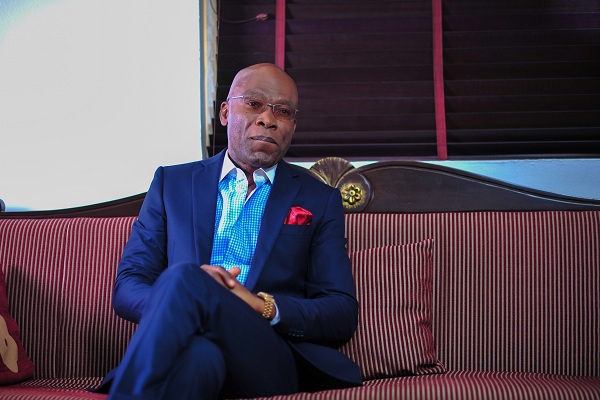Broadcasting
2023: Who Will Go for the Igbo? – Our Best 3 Candidates

By Jonathan C. Nnakwube (Ph.D.)
With 2023 just around the corner, the race to determine who succeeds incumbent President Muhammadu Buhari as the holder of the top job in Nigeria is beginning to gather steam.

Already, several candidates have thrown their hats into the ring, with some of them, like the former Lagos State Governor, Asiwaju Bola Tinubu not hiding their clear interest in the presidency.
One of the major issues shaping the conversations around the 2023 presidential election is the Igbo question. There is a strong argument for the South East to get a shot at the presidency, especially considering the fact that the region has endured an extended hiatus from the seat of power, coupled with the school of thought that an Igbo presidency has the tendency to quell the worrisome agitations in the region and provide the much-needed sense of belonging.
Further shoring up the argument for the Igbo cause is the position of political watchers, many of whom have pointed out the fact that the South East has a strong case of marginalization, notably when one considers how it has fared in comparison to other regions, as far as the presidency is concerned.
For this school of thought, presidential powers in Nigeria have largely rotated between the North and the South West. They point to the Olusegun Obasanjo presidency which saw Atiku Abubakar, who hails from Adamawa in the North East as his side-kick for eight years; the short-lived Umar Musa Yar-Adua administration which threw up a South-South deputy in the person of Goodluck Jonathan and who later contested and won a four-year term with another Northerner, Namadi Sambo as vice president; as well as the incumbent eight-year administration of Buhari with a South-Western candidate, Yemi Osibanjo as vice president.
In their view, the fair thing would be to return the presidency to the South and allow the South-South to complete its eight years, four of which have already been enjoyed by Jonathan or better still, support an Igbo candidacy as successor to Buhari.
While another school of thought has continued to argue that the South East lacks a truly unified voice, a throwback to the republican nature which lends a fiercely decentralized, individualistic mindset in most South Easterners, others have also insisted that the region lacks the nous, the know-how and the guile to play national politics; the top-tier type loaded with high-wire stakes, lobbying and horse-trading that would guarantee a shoo-in for its candidate into Aso Rock.
Nevertheless, one thing that all parties agree on is the fact that the South East certainly deserves a chance to lead Nigeria again.
Undoubtedly, 2023 is perceived widely as a pivotal year for Nigeria on the political front. Bedeviled for donkey years by a combination of inept leadership and stunted development, the Nigerian state is home to a growing army of digitally savvy youths, many of whom are now boldly challenging the status quo and calling more loudly for better governance. The foregoing came to the fore during the #EndSARS protests which rocked Nigeria in October 2020 as an army of disenchanted youths, under a movement which began as an opposition to widespread police brutality, expanded its agitations to clarion calls for an end to bad leadership. It took the combined might of state power and a bloody night at the now-infamous Lekki Toll Gate in Lagos to put down the movement.
However, the warning signals are there that these youths are no longer just frustrated at the current state of affairs, but that they would also no longer stand by and watch with folded arms.
Also reinforcing the critical importance of the 2023 elections for the future of Nigeria is the sweeping changes in the global ecosystem, led by the growing powers of technology as a leveler and heightened by the COVID-19 pandemic. Many Nigerian youths today are resident in the country but working for firms or corporations abroad from the comfort of their homes. Others are fleeing the country in droves, either migrating as skilled hands or fueling the ranks of those seeking higher education in advanced climes, as COVID and the pervasive influence of technology continue to disrupt the global economy.
The foregoing has seen more Nigerians gainfully join the Diaspora, with these new additions who have now experienced working systems in other climes, lending their voices and joining the bandwagon of those demanding a better Nigeria.
The view among some of these thinkers and a growing segment of political watchers in Nigeria is that, in order to get it right on the leadership front, Nigeria requires a shift from traditional politicians, many of whom have failed to distinguish themselves in office. In other words, the reasoning is that the time is right for the country to explore the possibility of backing credible entrepreneurs who have built successful businesses, rather than rely on the established norm of having ill-suited career politicians in office.
Viewed from this perspective and against the backdrop of the Igbo candidacy, there is a consensus that the South East can certainly throw up a handful of very strong names, highly capable candidates that can bring their wealth of entrepreneurial experience to bear in leading Nigeria out of the woods and repositioning it as a dominant force on the continent and one to be reckoned with globally.
This list is certainly not exhaustive but here is a short list of three names that remain top of mind after rigorous examination. These men do not only rank as successful entrepreneurs, but they have equally demonstrated proof of being men whose leadership abilities can be counted on.
ABC Orjiako: Simple, unassuming and a man of means, Ambrose Orjiako is one of the useful names that springs up when it comes to sound entrepreneurial presidential options from the South East. A medical doctor by training, Dr. Orjiako holds the record of being the brains behind Seplat – the first publicly listed oil company in Nigeria. To his credit, ABC Orjiako has years of credible experience as a successful entrepreneur, having first cut his professional teeth with Shebah E&P, an oil exploration company which later metamorphosed into Seplat Petroleum Development Company, becoming the first Nigerian company to take over operation of a Joint Venture asset from Shell, Total and Eni. Given his vast international connections, Orjiako is a man whom many believe would be able to attract significant global investments to Nigeria. He is also well-educated, a factor that would represent a clear departure from the previous grain of past leaders of Nigeria. The only blot on Orjiako’s seemingly pristine record would be his misadventure with Seplat which has been embroiled in a long legal tussle with some commercial banks over alleged indebtedness and from which he is expected to stand down as Chairman in May 2022 after the company’s Annual General Meeting (AGM) when an independent chairperson will take over.
Leo Stan Ekeh: If there is one man who would receive unanimous acclaim, not only locally here in Nigeria but globally, as presidential material of Igbo extraction, it would be Leo Stan Ekeh. An internationally recognized tech guru, Leo Stan, as he is fondly called by his peers, is Chairman of the Zinox Group, a business conglomerate which has dominated the Nigerian and Sub-Saharan African technology ecosystem for many decades. Ekeh is a man of few words but his legendary strides as a globally certified serial digital entrepreneur speaks volumes. He is also the brains behind the Konga Group, a flourishing e-commerce chain which he acquired, almost at the point of asphyxiation, from foreign owners but which, from feelers gathered, has been transformed by him and his team into a profitable entity and the beautiful bride of Nigerian and African e-commerce. He also holds the enviable record of building many successful businesses in his chosen field of technology, all of which have greatly contributed in putting Nigeria on the map. Most importantly, Ekeh has remained above reproach in his personal and business dealings, with informed sources describing him as one Nigerian businessman who has hardly taken any loans or been indebted to any banks, either here in Nigeria or abroad. In addition, Ekeh is of the digital parish, a charismatic knowledge democracy promoter, a gender sensitive enthusiast, generous philantropist and a global citizen who is on first name terms with other global tech icons such as Amazon’s Jeff Bezos and Alibaba’s Jack Ma. His far-reaching connections and influence in technology, which today has become widely regarded as the determinant of the wealth of nations, are factors that further distinguish him, aligned to his selflessness, humane disposition and legendary humility. While the true measure or extent of Ekeh’s wealth remains a subject of conjecture – a point that can be attributed to the fact that he is not a noise maker – those in the know describe him as a man who is of a vastly firmer financial standing than some of the popular names in the Nigerian business space. Also working in his favour is the fact that the Zinox Chairman has friends across boundaries in Nigeria, by virtue of his business dealings which have seen him deploy solutions or set up offices or stores across the nooks and crannies of the country. This point is of critical importance as the new Nigeria requires a leader with a broad, national outlook. The only downside in Ekeh’s resume is that he has never hidden the fact that he is not a politician, but this, in itself, can be considered a plus or positive as one can be assured that in Ekeh, Nigeria would not have a leader bogged down by the foibles or failings of traditional politics and its debilitating nuances.
Allen Onyema: Chief Executive Officer (CEO) and founder of Air Peace, Chief Allen Onyema is yet another name out of the South East whom many believe has the credentials to lead Nigeria. Onyema has made a success of Air Peace which he launched in 2013 and has continued to use the business to demonstrate his status as a responsible corporate citizen and a nationalist. Onyema, through Air Peace, has consistently airlifted stranded Nigerians, notably during the lockdown imposed as a result of the COVID-19 pandemic in the UK and other countries. Also, other Nigerians stranded or set for deportation in some African countries such as Libya have enjoyed the benevolence of the Air Peace Chairman. Onyema, a lawyer by training, is a man who has displayed keen business intelligence and aptitude, as demonstrated in the way he has taken Air Peace to the pinnacle of the highly competitive and capital-intensive airline industry. His dedication to the Nigerian cause is not in doubt and while he may not be a career politician, Onyema’s entrepreneurial exploits and understanding of the challenging diversity of Nigeria certainly place him in good stead for the top job in the land. Perhaps, the only blot on his record is his alleged indictment for bank fraud and money laundering to the tune of $20 million by the United States government.
Jonathan C. Nnakwube (Ph.D.) writes from Germany
Broadcasting
Tim Akano Recounts 20-Year Growth, Media Support at NITRA End-of-Year Meet

Mr. Tim Akano, New Horizons Chief Executive Officer, took centre stage at the Nigerian Information Technology Reporters’ Association (NITRA) annual end-of-year meeting on Thursday, December 18, 2025, recounting the company’s remarkable growth and reaffirming free IT training for journalists.

Tim Akano, New Horizons Chief Executive Officer, in a group photograph with NITRA Members
Speaking directly to IT media members at the company’s training facility in Lagos, Akano acknowledged the critical role journalists played in supporting New Horizons during its formative years two decades ago.
He detailed how the firm evolved from a handful of staff to one of Africa’s leading ICT skills training organisations, now employing about 500 staff across multiple training centres nationwide.
Akano Spotlights Youth Training, University Partnerships
Akano highlighted that New Horizons has trained over 500,000 youths, particularly tertiary institution students, equipping them with practical IT skills essential for Nigeria’s digital economy.
He announced recent partnerships with universities, including a new agreement with Afe Babalola University, to scale hands-on training programmes for students.
“This growth would not have been possible without the media’s support in documenting our journey,” Akano stated, pledging continued free IT skills training for media members to remain competitive in the evolving digital landscape.
Reciprocal Support Defines Long-Standing Partnership
The venue hosting the NITRA meeting underscored Akano’s generosity; NITRA Secretary Chidiebere Nwankwo secured the free facility after contacting him—a gesture consistent with New Horizons hosting multiple association events and training IT journalists since its inception 20 years ago.
Participants shared personal testimonies of Akano’s support, including veteran journalist Aaron Ukodie, whose daughter—an Accounting graduate from the University of Johannesburg—received NYSC placement and IT scholarship at New Horizons.
The Guardian’s Yemi Adeyemi recounted Akano accommodating his editor’s child for mandatory IT training after other firms declined.
Members praised Akano’s commitment to human capital development as evidence of deep appreciation for the media community that chronicled New Horizons’ success over two decades.
Broadcasting
NIMC rolls out Pre-Enrolment Portal for seamless NIN registration

National Identity Management Commission (NIMC) has launched the NIMC Pre-Enrolment Portal to revolutionise the National Identification Number (NIN) enrolment process, enabling applicants within Nigeria and in the Diaspora to capture biodata online prior to biometric verification at enrolment centres.

NIMC
Accessible via penrol.nimc.gov.ng, the platform allows users to fill enrolment forms, schedule appointments, upload supporting documents securely, and manage personal details directly, thereby slashing congestion, minimising wait times, boosting data accuracy and enhancing overall service efficiency at centres nationwide.
NIMC Director-General and CEO, Engr. (Dr) Abisoye Coker-Odusote, spearheaded the initiative as part of the Commission’s technology-driven strategy to fortify institutional performance, aligning with President Bola Ahmed Tinubu’s Renewed Hope Agenda that emphasises digital transformation, efficient public service delivery and inclusive national development.
Dr Kayode Adegoke, Head of Corporate Communications, highlighted key benefits including simplified biodata handling, confidential data protection through robust security measures, reduced physical centre visits and heightened operational effectiveness, urging all prospective enrollees to adopt the portal for a faster, citizen-friendly experience.[conversation_history]
The move underscores NIMC’s mandate under the NIMC Act No. 23 of 2007 to manage the National Identity Database, issue NINs and foster a reliable digital identity ecosystem vital for national planning, with users advised to complete pre-enrolment online before heading to selected centres for biometrics.
Broadcasting
MultiChoice Talent Factory Calls for Entries Into Fully Funded Film Training Programme

MultiChoice Talent Factory (MTF), a Pan-African film and television training institution, has announced the opening of applications for its 2026 intake.

MultiChoice
The fully funded programme is open to African graduates aspiring to become directors, filmmakers, scriptwriters, producers and storytellers.
According to MultiChoice, the nine-month accredited curriculum combines online learning with intensive in-person training, and is designed to balance theoretical knowledge with practical immersion.
MTF academies are located in Kenya, Nigeria and Zambia, and serve aspiring filmmakers from 14 African countries. Since its inception in 2018, the initiative has trained 296 filmmakers, with graduates producing more than 42 movies aired on DStv, GOtv and Showmax platforms.
Organisers said alumni of the programme have gone on to establish over 50 production companies, while many continue to work within the MultiChoice ecosystem.
Graduates have also won accolades at the Africa Magic Viewers’ Choice Awards, Kalasha Awards, Uganda Film Festival and Women in Film Awards.
Applications for the 2026 intake close on Feb. 27, 2026. Interested candidates can visit https://apo-opa.co/3XW53oE for programme requirements.

 E-Financial2 days ago
E-Financial2 days agoBanks quietly move to enforce new ₦50 transfer levy from Jan. 1

 Telecom3 days ago
Telecom3 days agoNigeria’s Internet Usage Hits 1.24m Terabytes – NCC

 General News2 days ago
General News2 days agoEcobank Guarantees Seamless Digital Banking Services Throughout the Christmas and Year-End Period

 News1 day ago
News1 day agoHow Moniepoint’s Founders, Tosin Eniolorunda and Felix Ike are Redefining African Tech and Finance























